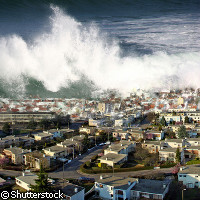Rising sea level threat worse than expected
If greenhouse gas emissions are not reduced, global sea levels are likely to increase by 1 metre or more by the next century. The dire prediction, made at the International Scientific Congress on Climate Change in Copenhagen, Denmark, announces significantly higher levels than those forecast by experts only two years ago. Could this be the alarm bell that signals the need for drastic change worldwide? In 2007, the Intergovernmental Panel on Climate Change (IPCC) predicted a sea level rise of between 18 and 59 centimetres. The report warned, however, that the calculations were made without a complete picture of the impact specific forces are having on the Greenland and Antarctica ice sheets. 'The numbers from the last IPCC are lower bound because it was recognised at the time that there was a lot of uncertainty about ice sheets,' explained Professor Eric Rignot of the University of California Irvine in the US. 'The numerical models used at the time did not have a complete representation of outlet glaciers and their interactions with the ocean. 'The results gathered in the last two to three years show that these are fundamental aspects that cannot be overlooked. As a result of the acceleration of outlet glaciers over large regions, the ice sheets in Greenland and Antarctica are already contributing more and faster to sea level rise than anticipated. If this trend continues, we are likely to witness sea level[s] rise one metre or more by year 2100,' said Professor Rignot. Professor Stefan Rahmstorf of Germany's Potsdam Institute for Climate Impact Research (PIK) explained that the sea level rise is linked to temperature, and 'will accelerate as the planet gets hotter'. A recent article published by PIK researchers clearly showed that the line to dangerous climate change could be crossed much earlier than experts had previously envisaged. Sea level measurements taken across the globe reveal that the level has risen 20 centimetres since 1880, almost 130 years ago. These new calculations suggest that it will rise 5 times as much in less than 100 years. Dr John Church of the Centre for Australian Weather and Climate Research explained that the most up-to-date satellite and ground-based observations show that the sea level has been rising at a rate of 3 millimetres (or more) each year since 1993. Dr Church and his team found that even with a total rise of 50 centimetres, there will be a significant increase in coastal flooding. 'Our study, centred on Australia, showed that coastal flooding events that today we expect only once every hundred years will happen several times a year by 2100,' he said, highlighting that even modest projections will result in very serious effects. A 2007 study published in Environment and Urbanization showed that 600 million people around the world (10 % of the world's population) live in areas that are in danger of being flooded. 'Unless we undertake urgent and significant mitigation actions,' said Dr Church, 'the climate could cross a threshold during the 21st century, committing the world to a sea level rise of metres.' The International Scientific Congress on Climate Change is hosted by the International Alliance of Research Universities (IARU). The IARU comprises the Australian National University, ETH Zürich (the Swiss Federal Institute of Technology), the National University of Singapore, Peking University, the University of California, Berkeley, the University of Cambridge, the University of Copenhagen, the University of Oxford, the University of Tokyo, and Yale University. Conclusions from the congress will be published in a synthesis report in June 2009.
Countries
Denmark

